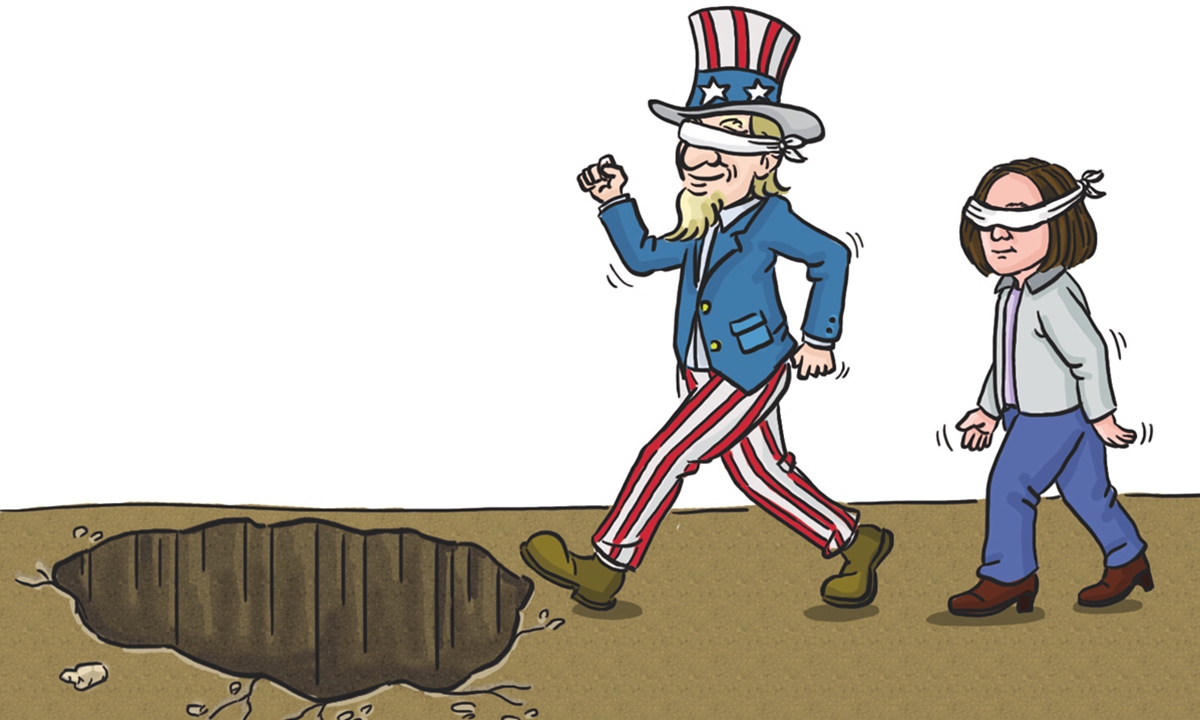US, Taiwan cannot shake mainland’s bottom line: Global Times editorial
Source: Global Times Published: 2020/8/5 21:48:42

Illustration: Xia Qing/GT
US Health and Human Services Secretary Alex Azar will visit the island of Taiwan "in the coming days." The last time a US cabinet official visited the island was in 2014, when then Environmental Protection Agency administrator Gina McCarthy paid a visit. As the Health and Human Services Secretary is a cabinet post, Azar's trip to the island will be more provocative.
Why did the US exercise restraint in sending officials to Taiwan in the past four decades? Because international rules require it to do so.
The US established diplomatic relations with the People's Republic of China on January 1, 1979 and cut its ties with the island of Taiwan at the same time. It's a manifestation of Washington's compliance with diplomatic norms that no official exchanges between the US and the island of Taiwan should be carried out. The "embassy" of the US in Taipei was renamed the American Institute in Taiwan, Taipei Office as a matter of course.
The US passed the so-called Taiwan Relations Act in January 1979, which forcibly opened a way for relations between Washington and the island of Taiwan outside the framework of China-US diplomatic relations. As the act seriously contravenes international law, Washington has maintained restraint in using it.
The past two years have seen the passage of a series of US bills, such as the so-called Taiwan Travel Act that allows higher-level US officials to visit the island of Taiwan. This has paved the way for new provocations against China. Azar's visit will be the boldest step taken by the US at a sensitive time.
If the US and the island of Taiwan have made up their minds to further enhance bilateral ties, they will have many cards to play. Azar's visit is only a sign. The Chinese mainland must be fully prepared for more moves from the US and the island of Taiwan. The Taiwan question is the lever that the US can most conveniently and comfortably use to exert pressure on China. It's the most challenging issue for China in its strategic maneuvering with the US.
Washington wants to undermine existing rules between China and the US in handling the Taiwan question. The international community, including Americans, knows that the US is deliberately provoking and pressuring China. As long as China handles it in a proper way, China will have the moral high ground to tackle the Taiwan question.
If the cross-Straits situation spirals out of control and leads to a military showdown, the US and the island of Taiwan will be less confident than the Chinese mainland. The mainland's military strength that has grown rapidly has an advantage in the Taiwan Straits. China has the moral high ground, and the Chinese people have the strong will to safeguard national unification.
It is anticipated that the US and the island of Taiwan dare not to push the situation in the Taiwan Straits to the extreme. The Trump administration cannot cross the line even if it wants to boost its election chances by heightening China-US tensions. If bilateral relations spiral out of control, it may deal a heavy blow to Trump's reelection. This is the risk Washington must carefully assess.
The US sent Azar to Taiwan as Washington needs to morally justify its provocation. As the epidemic situation in the US worsens, Washington uses health exchanges as an excuse. Beijing should expose the immorality of US provocation in the Taiwan Straits, and suppress US ambitions to further step across the line.
Even if China and the US have much room for cooperation, the latter is pushing bilateral relations toward a confrontation. Although the US tries to cover up its intentions with ideology, it destroys rules and the basis for communications between major powers, and hurts world peace and stability. China's necessary countermeasures against US provocations will create complexities to the international pattern, but are within the expectations of the international community, and will block the escalating collusion between the US and the island of Taiwan.
As China strengthens its morality, every card it plays will have greater deterrence. We should also make Taiwan society realize that indulging the Tsai Ing-wen authorities in upgrading US-Taiwan ties by "salami tactics" is a dangerous move, and being a pawn in the US' hard-line strategy toward China will lead the island of Taiwan to unbearable disaster.
The mainland has many cards, including the military card. More importantly, it is much more determined to play the cards than Washington.
Posted in: EDITORIAL